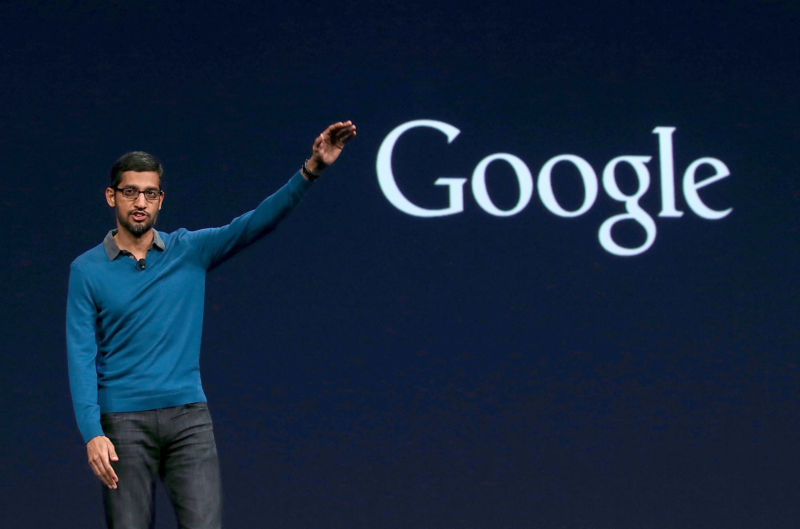
Eight years after Google dramatically pulled out of China over censorship issues, the company is preparing to reintroduce its search engine to the Chinese mainland, The Intercept reported on Wednesday. Offered as an Android app, the new search engine will "blacklist websites and search terms about human rights, democracy, religion, and peaceful protest," according to The Intercept's Ryan Gallagher.
A Google spokesperson declined to comment on its future plans but noted that Google already offers a number of other mobile apps on the Chinese mainland.
Google has been laying groundwork to return to the Chinese search market for more than a year, according to Gallagher. Google CEO Sundar Pichai met with Chinese officials in December to help secure approval for the project.
The search engine could be launched in six to nine months, Gallagher says, depending on Chinese government approval. The search engine is likely to be operated as a partnership with a Chinese company.
Google offered censored search a decade ago
Returning to China would represent a dramatic about-face for a company that pulled out of the country in 2010 over concerns about China's human rights record.
Google had operated a censored version of Google since 2006. The company began offering censored search results after the Chinese government banned Google's uncensored version provided from outside the country. In 2006, Google said that it decided to offer a censored product based on "the very pragmatic calculation that we could provide more access to more information to more Chinese citizens more reliably."
But Google was never fully comfortable with that compromise, and it faced significant criticism from Western free-speech activists for participating in China's censorship regime.
Then in late 2009, Google discovered a sophisticated Chinese hacking campaign targeting Google. "We have evidence to suggest that a primary goal of the attackers was accessing the Gmail accounts of Chinese human rights activists," Google wrote in a 2010 blog post. And the revelation triggered a larger rethink of Google's approach to China.
"We have decided we are no longer willing to continue censoring our results on Google.cn," the company wrote. It began negotiating with the Chinese government for permission to operate an uncensored version of Google, but those talks proved fruitless. Ultimately, Google shut down Google.cn and redirected users to the uncensored Hong Kong version of Google—which was promptly blocked for most mainland Internet users.
A lot has changed in the last eight years
While Google's hardline stance for human rights garnered plenty of praise in the West, it also came at a high cost for Google's bottom line. Internet use in China has exploded over the last eight years to an estimated 770 million users—more than double the population of the United States. That's a lot of potential ad revenue to be leaving on the table.
Meanwhile, Google cofounders Larry Page and Sergey Brin have become less involved in the day-to-day operations of the company, leaving Google CEO Sundar Pichai in charge. Pichai has long signaled that he wants to bring Google back to China. "I care about servicing users globally in every corner. Google is for everyone," Pichai said in 2016. "We want to be in China serving Chinese users."
Asked about bringing its search engine back to China, Pichai said that "if we can do it in a right and thoughtful way, we are always open to it. It depends on the situation."
Google has already taken significant steps toward a larger Chinese presence. Google opened a Chinese research center in Beijing last December—around the same time Pichai was reportedly talking to Chinese officials about bringing its search engine back to China. Google also now offers a Chinese version of a file management app that was originally designed for the Indian market, where many consumers have smartphones with limited storage.
Another big change in the last eight years: the Chinese market is now dominated by smartphones, with vastly more people accessing the Internet using Android smartphones than desktop computers. The Intercept reports that Google's search engine project has focused on building an Android search app. It's not clear when a desktop version of the site would become available.
And Chinese censorship has only intensified over the last eight years. Chinese President Xi Jinping has tightened his grip on power in China and has more aggressively censored content that criticizes Xi or the Chinese government.
Censored results from Google's new search engine will come with a disclaimer that says, "some results may have been removed due to statutory requirements," according to documents obtained by the Intercept. Some sensitive queries will return no results at all.
Even if Google decides to accept search censorship as the price of offering a Chinese search engine, that's unlikely to be the last uncomfortable demand it will face from the Chinese government. It can expect the Chinese government to begin demanding data from Google users—including information from critics of the Chinese regime. Resisting those requests will get harder if Google has a substantial Chinese business and employees operating on the Chinese mainland.
Apple faced criticism earlier this year when it moved a key data center to the Chinese mainland, making it easier for the Chinese government to obtain the encryption keys required to unlock users' iCloud accounts. Previously, these keys had been stored in the United States, requiring people to go through the US legal system to gain access.
reader comments
131